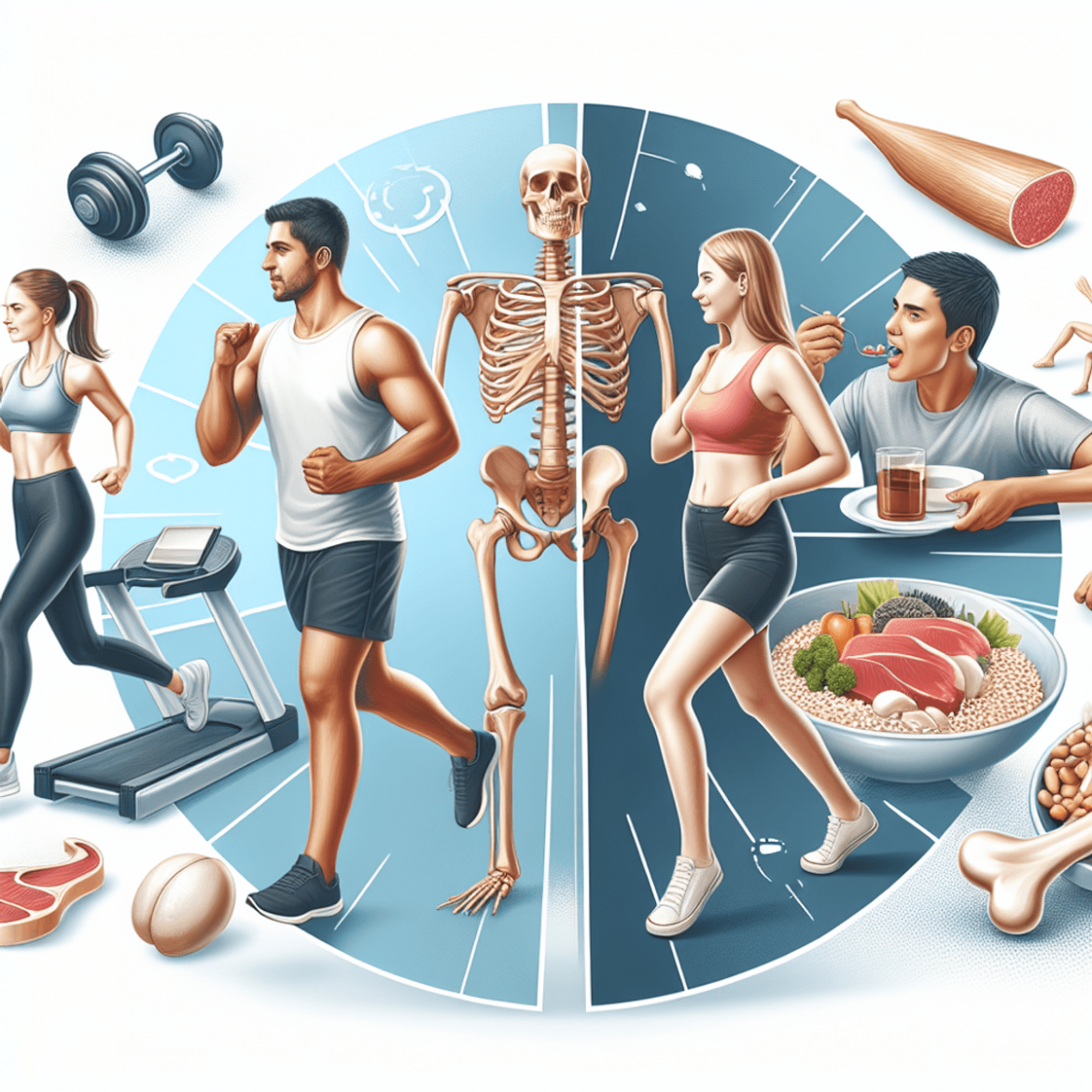Introduction
Maintaining strong bones is crucial for overall health and mobility. Bone health impacts everything from physical strength to the prevention of fractures and osteoporosis.
Protein plays a vital role in bone health by contributing to both the structural integrity and functional aspects of bones. Adequate dietary intake of protein supports optimal bone mass gain during growth phases and helps preserve bone and muscle mass, particularly in older adults.
In this article, we explore the multifaceted relationship between protein and bone health. We’ll discuss:
- Bone anatomy and the role of proteins
- How protein enhances calcium absorption
- The influence of Insulin-like Growth Factor-1 (IGF-1)
- Protein intake recommendations across different age groups
- Nutritional strategies for maintaining strong bones
By understanding these connections, you can make informed dietary choices to support long-term bone health.
Understanding Bone Structure and Function
Overview of Bone Anatomy
Bones are complex structures that serve as the framework for the human body. They consist of a dense outer layer known as the cortical bone and a spongy inner layer called trabecular bone. The cortical bone provides strength and rigidity, while the trabecular bone aids in flexibility and shock absorption.
Role of Proteins in Bone Composition
Proteins play a significant role in maintaining both the structural integrity and functional aspects of bones. They constitute approximately 50% of bone volume and about one-third of its mass. Key proteins, such as collagen, form a matrix that provides a scaffold for mineral deposits like calcium phosphate. This framework is essential for the elasticity and tensile strength of bones.
Functions of Bones in the Body
Bones perform several critical functions:
- Support: They provide structural support for muscles and tissues.
- Protection: Bones protect vital organs, such as the brain, heart, and lungs.
- Movement: Bones act as levers that muscles pull on to create movement.
- Mineral Storage: They store essential minerals like calcium and phosphorus.
- Blood Cell Production: Bones contain marrow, which produces red and white blood cells.
Understanding these aspects underscores the importance of maintaining optimal protein levels for healthy bones.
The Importance of Protein for Bone Health
How Protein Contributes to Optimal Bone Mass Gain During Growth Phases
During childhood and adolescence, the body undergoes rapid growth and development. Adequate dietary protein is crucial during these phases as it supports the formation of new bone tissue. Protein provides essential building blocks that are necessary for the synthesis of collagen, a primary component of bone matrix. This contributes to optimal bone mass gain, laying a strong foundation for future bone health.
The Connection Between Protein Intake and Increased Bone Density
Research has shown a direct link between protein intake and increased bone density. Higher protein diets are often associated with better bone mineral density (BMD), which is a key indicator of bone strength. As we age, maintaining or improving BMD becomes increasingly important to prevent conditions like osteoporosis. Studies have demonstrated that individuals who consume adequate amounts of dietary protein tend to have higher BMD compared to those with lower protein intake.
Protein’s Role in Reducing Fracture Risk
Adequate protein consumption plays a significant role in reducing fracture risk. Strong muscles support and protect bones, reducing the likelihood of falls and fractures. A diet rich in protein helps preserve muscle mass and strength, particularly in older adults who are more prone to falls. Additionally, sufficient protein intake can enhance the body’s ability to absorb calcium, further strengthening bones and minimizing fracture risk.
By understanding how dietary protein impacts bone health from various angles—bone mass gain during growth phases, increased bone density, and reduced fracture risk—you can make informed dietary choices that support long-term bone health.
Protein and Calcium Absorption
Calcium absorption is crucial for bone health, and protein plays a significant role in enhancing this process. Adequate protein intake has been shown to improve the body’s ability to absorb calcium efficiently, which is vital for maintaining strong bones. The relationship between protein and calcium absorption underscores the importance of incorporating sufficient protein into your diet.
Recommended Dietary Sources Rich in Both Protein and Calcium:
- Dairy Products: Milk, cheese, and yogurt are excellent sources of both protein and calcium.
- Leafy Greens: Vegetables like kale, spinach, and broccoli provide a good amount of calcium along with some protein.
- Fish: Fatty fish such as salmon and sardines offer both high-quality protein and significant amounts of calcium.
- Nuts and Seeds: Almonds, chia seeds, and sesame seeds are rich in these essential nutrients.
- Legumes: Beans, lentils, and chickpeas contribute to your daily intake of both protein and calcium.
Including these foods in your diet can help ensure that you receive the necessary nutrients for optimal bone health. By focusing on dietary sources rich in both protein and calcium, you can support efficient calcium absorption and maintain strong bones throughout your life.
Insulin-like Growth Factor-1 (IGF-1) and Bone Formation
Insulin-like Growth Factor-1 (IGF-1) is a hormone that plays a crucial role in maintaining healthy bones. It is especially important during periods of rapid growth, such as childhood and adolescence, when bones are developing quickly.
How IGF-1 Affects Bone Health
IGF-1 has a direct impact on the cells responsible for building bones called osteoblasts. It encourages these cells to multiply and work more efficiently, resulting in increased bone density and strength.
The Role of Protein in IGF-1 Production
One key factor that influences IGF-1 production is protein intake. When we consume enough dietary protein, our bodies are able to produce more IGF-1. This hormone then goes on to support healthy bone metabolism.
Why Protein Matters for Bone Health
Research has shown a clear connection between higher protein consumption and elevated IGF-1 levels. This, in turn, leads to improved bone formation and a reduced risk of developing osteoporosis.
To maintain optimal levels of IGF-1 for bone health, it is essential to include sufficient amounts of protein in our diets. Here are some examples of high-protein foods you can incorporate:
- Lean meats: Chicken, turkey, beef
- Fish: Salmon, tuna
- Dairy products: Milk, yogurt, cheese
- Legumes: Beans, lentils, chickpeas
- Nuts and seeds
By ensuring that your diet includes a variety of these foods, you can help sustain the beneficial effects of IGF-1 on your bones throughout your life.
Monitoring Protein Intake for Better Bone Health
For individuals looking to increase their protein intake and subsequently boost IGF-1 production, paying attention to your protein consumption can be an effective strategy.
Protein Intake Recommendations for Different Age Groups
Age-related nutrition is critical to ensure optimal bone health throughout life. The recommended daily allowance for protein varies across different age groups, reflecting the changing needs of our bodies as we age.
Children and Adolescents
During growth phases, adequate protein intake is essential:
- Children (4-13 years old): Approximately 0.95 grams of protein per kilogram of body weight daily.
- Adolescents (14-18 years old): Around 0.85 grams of protein per kilogram of body weight each day.
This period involves rapid bone development and increased muscle mass, underscoring the importance of meeting these nutritional requirements.
Adults
For adults, maintaining a consistent intake is crucial to support ongoing bone maintenance and overall health:
- Adults (19+ years old): The general recommendation is 0.8 grams of protein per kilogram of body weight per day.
Special Considerations for Elderly Individuals
As individuals age, the risk of conditions like sarcopenia increases. Thus, elderly people often require higher protein intake to preserve muscle mass and bone density:
- Elderly individuals (65+ years old): Some experts suggest increasing protein intake to about 1.0-1.2 grams per kilogram of body weight daily due to the body’s reduced efficiency in processing proteins.
Ensuring that their diet includes high-quality protein sources can significantly impact their ability to maintain strength and reduce fall risk.
Key Takeaway: Adjusting protein intake according to age-specific needs helps promote healthy bone development in youth, maintain bone health in adulthood, and combat age-related muscle loss in older adults.
Addressing Sarcopenia and Frailty in Older Adults
Sarcopenia refers to the age-related loss of muscle mass and strength, which can significantly impact overall health. This condition is closely linked with frailty, increasing the risk of falls, fractures, and diminished quality of life. Understanding sarcopenia and its implications is crucial for older adults aiming to maintain their independence and mobility.
The Importance of Protein in Combating Sarcopenia and Frailty
Adequate protein intake plays a pivotal role in combating muscle loss and frailty:
- Protein supports muscle synthesis: Consuming sufficient protein helps stimulate muscle protein synthesis, which is essential for maintaining muscle mass.
- Improves physical performance: Adequate protein intake can enhance muscle strength and function, reducing the risk of falls.
- Supports recovery: Protein aids in the repair and growth of muscle tissues, which is vital after injuries or surgeries.
Recommended Protein Intake for Older Adults
Research suggests that older adults should increase their protein intake beyond the standard recommendation of 0.8 g/kg body weight per day to combat sarcopenia effectively. Aiming for at least 1.0–1.2 g/kg body weight can be more beneficial.
Sources of High-Quality Protein
Incorporating high-quality protein sources into daily meals can help meet these requirements:
- Lean meats (chicken, turkey, beef)
- Fish and seafood
- Dairy products (milk, yogurt, cheese)
- Legumes (beans, lentils)
- Nuts and seeds
The Synergistic Effect of Diet and Exercise
Combining a protein-rich diet with regular physical activity can further enhance muscle retention and reduce frailty risks. Engaging in resistance training exercises alongside adequate protein intake has shown promising results in preserving muscle mass and strength among older adults.
Understanding the connection between adequate protein intake and maintaining muscle health is essential for promoting longevity and an active lifestyle among older adults.
Understanding the Link Between Protein Intake and Fracture Risk
Research has found that diets high in protein are associated with a lower risk of fractures, especially when calcium intake is also sufficient. Studies suggest that getting enough protein from food not only helps maintain healthy muscles but also improves bone density, which directly reduces the likelihood of fractures. Preventing fractures is crucial for ensuring a good quality of life, particularly for older adults who are more prone to falls and injuries.
The Role of Nutrients in Bone Health
It’s important to balance protein intake with other nutrients to fully benefit from its positive effects on bone health. Here are some key nutrients that work together with protein:
- Calcium: This mineral is essential for making bones strong and sturdy. When you consume enough calcium, your body can effectively use the protein you eat to support the structure of your bones.
- Vitamin D: This vitamin plays a crucial role in helping your body absorb calcium, which is vital for mineralizing your bones.
- Magnesium: Magnesium works alongside calcium to maintain the structure and function of your bones.
The Impact of Protein on Bone Mass
Various studies focusing on diets have shown that individuals who consume higher amounts of protein tend to have greater bone mass and strength compared to those with lower protein intake. This connection emphasizes the significance of having a balanced diet that includes not only proteins but also the necessary vitamins and minerals required for overall bone health.
Personalizing Your Protein Intake
While high-protein diets offer advantages, it’s important to customize them according to individual nutritional requirements. Consuming excessive amounts of protein without adequate calcium can create imbalances that may counteract potential benefits. Therefore, including a variety of nutrient-rich foods such as dairy products, lean meats, legumes, nuts, and green leafy vegetables can help achieve this balance.
By incorporating these essential components into your diet, you can make significant strides in reducing the risk of fractures and promoting lifelong bone health.
Nutritional Strategies for Optimal Bone Health
A balanced diet rich in essential nutrients is crucial for maintaining bone health. Proteins, along with vitamin D and calcium, play important roles in strengthening your bones throughout life.
Key Nutrients for Bone Health
- Protein: Supports bone formation, increases bone density, and reduces fracture risk.
- Calcium: Essential for bone mineralization, ensuring bones remain dense and strong.
- Vitamin D: Enhances calcium absorption, promoting optimal bone health.
Dietary Sources
- Protein: Lean meats, fish, eggs, dairy products, legumes, nuts, and seeds.
- Calcium: Dairy products like milk and cheese, leafy green vegetables, almonds, and fortified foods.
- Vitamin D: Fatty fish (salmon, mackerel), egg yolks, fortified dairy products, and exposure to sunlight.
Practical Tips
- Combine protein-rich foods with calcium sources. For example, pair yogurt with nuts or leafy greens with lean meats.
- Ensure adequate vitamin D intake through diet and sensible sun exposure to maximize calcium absorption.
- Aim for diversity in food choices to cover all essential nutrients necessary for bone health.
Adopting these strategies will help you maintain strong bones throughout your life.
Recovery from Bone Injuries
Proper nutrition, especially protein intake, is crucial for recovering from bone injuries like hip fractures. Protein helps repair and regenerate bone tissue, which is essential for healing.
Why Protein Matters for Recovery
Getting enough protein in your diet is important because it supports the production of collagen and other proteins that make up the bone structure. This, in turn, speeds up the healing process.
The Benefits of Sufficient Protein Intake
Research shows that people who consume enough protein tend to recover faster and have better outcomes after bone injuries. This includes experiencing less pain and spending less time in the hospital.
Evidence Supporting the Importance of Protein
- Better Bone Healing: Studies indicate that patients recovering from hip fractures who eat more protein have improved bone density and strength.
- Preservation of Muscle Mass: Protein plays a key role in maintaining muscle mass during periods when movement is restricted, such as after severe fractures. This preservation is vital for regaining mobility and preventing future falls.
Including nutrient-rich foods in your diet can greatly influence your recovery after a bone injury. Make it a goal to incorporate lean meats, dairy products, legumes, and nuts into your meals to ensure you’re getting enough protein and other essential nutrients needed for optimal healing.
Conclusion
Protein is crucial for maintaining strong bones at every stage of life. It makes up a large part of our bone structure, helps us absorb calcium, and affects the production of important growth factors like IGF-1.
Key Takeaways:
- Bone Structure and Health: Protein makes up 50% of bone volume and about one-third of its mass.
- Growth and Maintenance: Adequate protein intake is essential during growth phases and for preserving bone density in adults.
- Reducing Fracture Risk: Higher protein diets are linked to reduced fracture risks, especially when calcium intake is sufficient.
Think about what you eat to keep your bones healthy for a long time. Adding protein-rich foods to your diet, along with other important nutrients like calcium and vitamin D, can greatly improve your bone strength and overall health.



